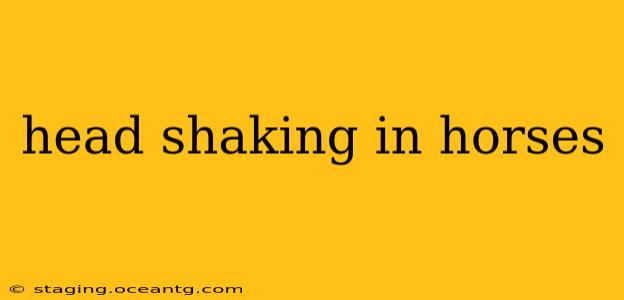Headshaking in horses is a debilitating condition characterized by rhythmic shaking of the head, often accompanied by other symptoms. While the exact cause remains elusive for many cases, understanding the potential triggers and available treatments is crucial for horse owners and veterinary professionals alike. This comprehensive guide delves into the complexities of equine headshaking, exploring its various facets and offering insights into effective management strategies.
What Causes Head Shaking in Horses?
The etiology of headshaking is multifaceted and often involves a complex interplay of factors. While some cases are clearly linked to specific irritants, others remain idiopathic, meaning the underlying cause is unknown.
Common Triggers:
-
Trigeminal Nerve Dysfunction: This is a frequently cited cause, involving irritation or dysfunction of the trigeminal nerve, responsible for sensation in the face and head. This can be triggered by various factors, including inflammation, nerve compression, or even subtle neurological abnormalities.
-
Allergies: Seasonal allergies (like pollen) or reactions to certain feeds or environmental irritants can trigger headshaking. The resulting inflammation can irritate the trigeminal nerve or other sensitive tissues in the head and face.
-
Eye Irritation: Problems with the eyes, such as corneal ulcers, dry eye, or conjunctivitis, can also cause horses to shake their heads. The discomfort stimulates the nerves, leading to the characteristic headshaking.
-
Dental Issues: Malocclusions (misaligned teeth) or other dental problems can contribute to headshaking. Pain from the teeth can radiate to the head, causing discomfort and leading to the repetitive shaking.
-
Sinus Infections: Inflammation or infection of the sinuses can cause significant pain and discomfort, leading to headshaking.
-
Other Neurological Conditions: In some cases, headshaking may be a symptom of a more serious underlying neurological condition.
What are the Symptoms of Head Shaking in Horses?
Headshaking manifests differently in various horses. While rhythmic head shaking is the hallmark sign, other symptoms might include:
- Frequency and Severity: Headshaking can range from mild and occasional to severe and constant.
- Facial Grimacing: Horses may show signs of discomfort or pain through facial expressions.
- Head Carriage: The horse may hold its head in an unusual position to try and alleviate discomfort.
- Sensitivity to Light: Some horses with headshaking exhibit sensitivity to bright light.
- Other Neurological Signs: In more severe cases, other neurological signs might be present.
How is Head Shaking in Horses Diagnosed?
Diagnosing headshaking requires a thorough veterinary examination. The vet will likely perform a detailed neurological exam, assess the horse's eyes and teeth, and consider the horse's history and environment. Diagnostic tests may include:
- Blood tests: To rule out underlying infections or allergies.
- Ophthalmological examination: To assess the eyes for any problems.
- Dental examination: To check for dental issues.
- Radiographs (X-rays): To visualize the sinuses and other structures in the head.
What Treatments are Available for Head Shaking in Horses?
Treatment approaches for headshaking vary greatly depending on the underlying cause. Options range from conservative management strategies to more intensive interventions.
-
Medications: Non-steroidal anti-inflammatory drugs (NSAIDs) may help reduce pain and inflammation. Other medications, such as antidepressants or antihistamines, may be used to address specific underlying causes.
-
Environmental Modifications: Managing the environment to reduce exposure to allergens or irritants is crucial. This might involve changing the horse's feed, using air filters in the stable, or avoiding certain areas during peak pollen seasons.
-
Eye Treatments: If eye problems are identified, appropriate eye drops or ointments will be prescribed.
-
Dental Treatments: Addressing any dental issues through dental floatation or other corrective procedures is essential.
-
Acupuncture and other Complementary Therapies: Some owners explore acupuncture, chiropractic, or other complementary therapies to manage symptoms. The effectiveness varies depending on the horse and the underlying cause.
Does Head Shaking in Horses Go Away?
The prognosis for headshaking varies considerably, depending on the underlying cause and the horse's response to treatment. Some horses experience significant improvement with appropriate management, while others may require ongoing treatment to control their symptoms. Early diagnosis and intervention are crucial for improving the chances of a positive outcome.
Can Head Shaking Be Prevented?
While preventing headshaking completely might not always be possible, proactive measures can help reduce the risk. These include:
- Regular Veterinary Checkups: Regular dental and ophthalmological exams can help identify and address potential problems early on.
- Careful Management of the Environment: Minimizing exposure to potential allergens and irritants is important.
- High-Quality Nutrition: Providing a balanced diet supports overall health and well-being.
How Long Does Head Shaking in Horses Last?
The duration of headshaking varies from horse to horse and depends on the underlying cause and effectiveness of treatment. It could range from a few days for a minor irritation to a chronic condition lasting for years.
Is Head Shaking in Horses Contagious?
No, headshaking in horses is not contagious and cannot be spread from one horse to another.
This article provides general information and should not be considered a substitute for professional veterinary advice. If your horse exhibits signs of headshaking, it’s crucial to consult with a veterinarian for proper diagnosis and treatment.
